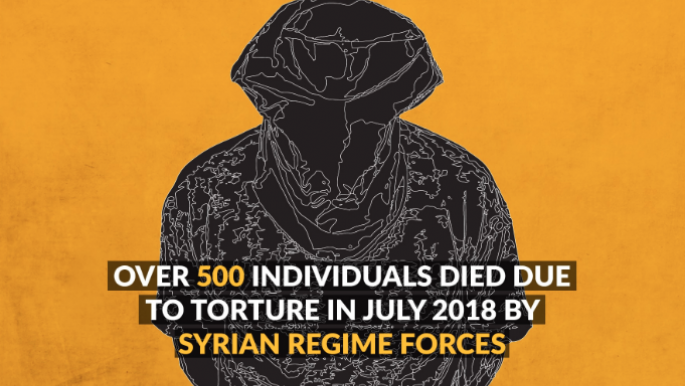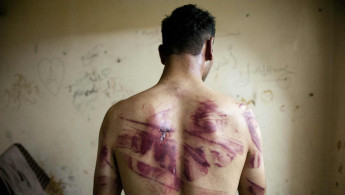Syria Weekly: A small step towards the fight for justice for Assad's victims
With the Syrian regime continuing its expansion into the northeast of the country this week, Bashar Al-Assad will now likely feel more secure than at any other point during the war.
Having securing rebel enclaves in south Syria and around Damascus in 2018, only rebel-held Idlib and some Turkish and Kurdish-controlled territories are in the way of Assad fulfilling his wish to "unite" the country by force, following the 2011 uprising.
It is a tactic that has seen whole towns flattened, millions forced to flee Syria, villages gassed, and hundreds of thousands of civilians dead.
With the UN hailing talks earlier this month on a post-war constitution, Assad appears to have gotten away with unimaginable crimes against humanity not witnessed in modern times.
'Human slaughterhouse'
This week, a Syrian human rights group highlighted another grim reality of the Syria war with a report on harrowing conditions at the notorious Sednaya prison, near Damascus.
The Association of Detainees and The Missing in Sednaya Prison interviewed hundreds of former detainees of the Syrian regime's "human slaughterhouse" for the report.
Their testimonies fitted with that of other victims of Sednaya prison, where endemic torture, mass killings and inhumane living conditions are a daily reality for thousands of detainees.
In all, the Syrian regime is thought to have murdered tens of thousands of pro-democracy protesters and other political prisoners since the start of the 2011 uprising. The United Nations believe that around 100,000 Syrians have been "disappeared" during the war.
Yet a small victory for human rights campaigners in faraway Norway could end the sense of impunity Syrian regime officials might be feeling.
"Our experience from other conflict zones and places where there's systematic repression is that the fear of being hauled before a court is a strong deterrent to would-be perpetrators," Kristyan Benedict, Amnesty International UK Crisis Campaigns Manager told The New Arab.
|
|
"What we're seeing now are the first cracks in the edifice of impregnability. Perpetrators in Assad’s network - including Bashar Al-Assad himself - will be feeling a little less sure of their ability to evade justice in light of these cases."
First step
Five Syrian refugees who were victims of torture in regime prisons filed statements to Norwegian police this week could be used against Damascus officials accused of crimes against humanity.
The victims said they were subject torture and witnessed killings during their time in regime jails, which have left them physically and mentally scarred.
One plaintiff told media that even with painkillers and sedatives she is unable to sleep for more than two hours a night due to her harrowing experiences in prison.
In all, 17 high-ranking Syrian regime officials have been named in the complaints, which can now be used by Norwegian policy investigators to prosecute the alleged torturers.
The campaign is part of pan-European wide efforts to bring Syrian regime officials responsible for mass torture and murder to account.
"Investigations and legal proceedings are ongoing in Austria, Sweden and France... several other governments are funding Syrian and international war crimes investigators and international bodies like the UN-backed IIIM (International Impartial and Independent Mechanism)," said Benedict.
"These are all positive moves, but of course investigators and lawyers - especially Syrians who themselves have often been victims of torture - need sustained support and much more investment."
Campaign for justice
Germany has seen legal action taken against two Syrian regime officials accused of torture.
The alleged intelligence agents have been charged by Germany prosecutors with crimes against humanity, with one man accused of 59 counts of murder and rape.
These cases are far from isolated and it is widely accepted that the Syrian regime operates an archipelago of prisons with the systematic use of torture and murder to sustain their rule.
An Amnesty International report in 2017 reported that 13,000 prisoners at Sednaya prison could have been hanged to death between 2011 and 2015.
Other uses of torture at the prison - often ending in death - includes immersing prisoners in boiling water, beatings, rape, and the use of the "German chair", a procedure that often results in victims having their backs broken.
Although the latest legal action in Europe is unlikely to end such practices, it will make Damascus aware their actions are being monitored. It could also give some hope to those with loved ones in Syrian prisons that justice is finally being pursued through legal channels.
"It's another very important step on the long road to securing justice for Syrians. It's also a strong signal to the Assad government that its numerous crimes can't and won't be 'normalised' or overlooked in the interests of what would be fake 'peace' and 'stability'," commented Benedict.
"It's a clear reminder to the members of Syria's political and military command structure responsible for the years of barrel bombing, gas attacks, military imprisonment, torture and killing - that the net could, and hopefully will, eventually close on them too."
 |
He added that the Norway case will give hope to the victims of torture and families of detained and disappeared that "momentum is building towards holding perpetrators to account".
International action
Sama Kiki, a Syrian activist, also welcomed the legal action being pursued in Norway despite its, so far, limited scale.
"Without real action from the world and governments, these cases will not help reducing acts of torture. Real action should be taken in order to limit those human rights violations in Syria,” said Kiki.
"However, the legal challenge in Norway is much needed as it gives people symbolic justice and I think for some this is very much needed."
Another danger of a post-Syria war peace without holding regime officials to account is that other dictators could pursue Assad's scorched earth policy to crush internal dissent.
"[The Norway action] is a very much needed and a must. Syrians have not been able to get justice so far and no government is taking responsibility for what is happening in Syria. A lack of action would cause more violations against Syrians and this is not good for the future of the world as leaving criminals without accountability means more violations," Kiki told The New Arab.
She said that leaving a dictator such as Assad in charge after the war and will "give a green light" to other to pursue the same ruthless policies in the future.
Kiki said it is now the responsibility of the international community to ensure that the regime does not escape justice, including for Assad's policy of decimating rebel areas.
"The regime did not, and will not, tell the truth about what happened during the war. The regime strategy was always been based on lies and distorting the narrative of the Syrian uprising. This is how the regime won and it will not take any action towards acknowledging those violations," Kiki added.
To prevent an offensive on Idlib, which activists say could lead to genocide, then a strong international response is needed. The action taken in Norway is a small but necessary step to inform the Assad regime that the world is watching.
Syria Weekly is a new, regular feature from The New Arab. To get Syria Weekly in your inbox each week, sign up here
Paul McLoughlin is a news editor at The New Arab.
Follow him on Twitter: @PaullMcLoughlin


![President Pezeshkian has denounced Israel's attacks on Lebanon [Getty]](/sites/default/files/styles/image_684x385/public/2173482924.jpeg?h=a5f2f23a&itok=q3evVtko)



 Follow the Middle East's top stories in English at The New Arab on Google News
Follow the Middle East's top stories in English at The New Arab on Google News


